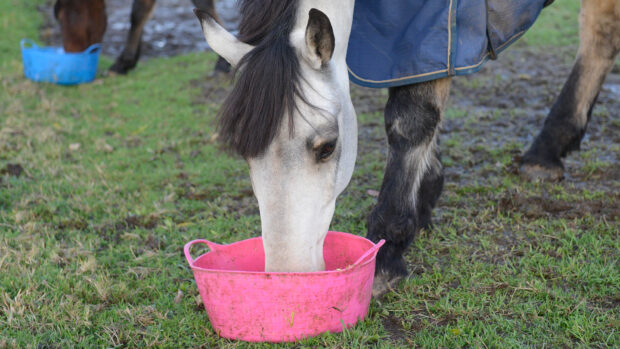A study investigating the link between diet and equine behaviour has shown that high-fibre rather than high-starch diets provide more energy for horses within work.
The research was conducted at Edinburgh University last year by Dr Jo-Anne Murray, researcher Louise Bulmer, from Glasgow University and Sebastian McBride, from Cambridge University.
The study focused on eight adult horses when grazing was sparse between January and March. The horses were all kept in light work — taking part in jumping and flat work for five days a week — with daily turnout for between four and six hours at weekends.
| Related articles |
The horses were fed two different diets during the study — both featuring exactly the same amount of energy and based on haylage.
One diet was fibre-based, with a starch level of 2% and the other included a cereal-based concentrate mix, with a starch level of 22%.
The horses were divided into two groups and fed each of the diets for 28 days in a crossover-design study.
Behaviour was measured throughout as the horses were introduced to new situations and equipment. Heart rate was also measured to monitor stress levels during the tests.
The study showed that, overall, the horses had higher heart rates — indicating higher stress levels — when exposed to new situations when fed a cereal-based concentrate mix compared to when they were given fibre-based feeds.
“This suggests that, although high-starch diets are considered an effective energy source for humans undertaking increased exercise, they are not necessarily ideal for providing energy for working horses,” said researchers.
“Instead, energy might be better provided by feeding good-quality fibre, as this type of diet appears to reduce reactivity, making horses easier to handle from the ground.”
The study was published in Applied Animal Behaviour Science and commissioned by feed manufacturers Dengie.
Clare MacLeod, who is an independent nutritionist registered with the Association for Nutrition told H&H this is “valuable research”.
“It is evidence for what we find anecdotally in the field — that high-starch diets can exacerbate reactivity — and it is good for our profession and for horse owners and riders if we have evidence for our recommendations,” she said.
“Feeding horses high-starch diets with high levels of grain and limited forage is from the dark ages. We’ve got evidence that such diets increase the risk of tying-up, colic, gastric ulcers, stereotypical behaviour, laminitis, insulin resistance, developmental orthopaedic disease, acidic gut syndrome and are associated with more reactive behaviour. Current recommendations are no more than one gram of starch per kilo of bodyweight per meal.”
Ref: H&H 27 August, 2015




